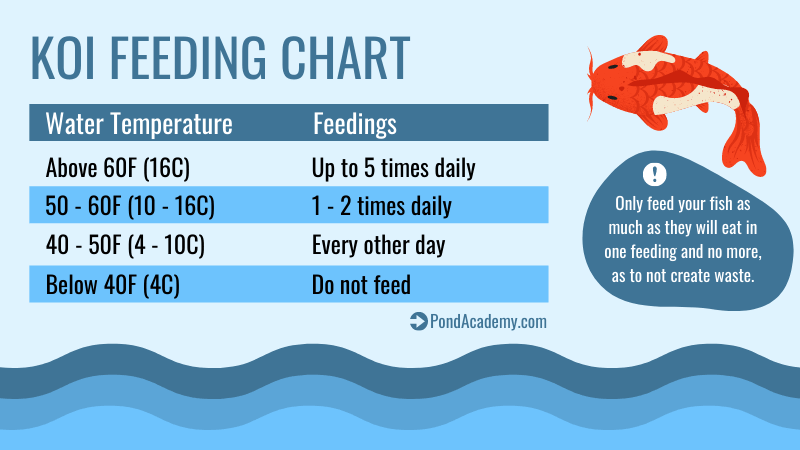Can Goldfish Live In a Pond (And Thrive)?
Goldfish can live and even thrive in a pond in the right conditions. In fact, it's believed that goldfish live on average a few years longer in a pond as opposed to an aquarium.
Of course, their health and lifespan will be directly affected by the quality of the pond's water. As with any fish pond, routine maintenance will be needed to keep your pond's water quality high and your fish healthy and happy.
Aside from regular pond maintenance (cleaning filters, removing debris, controlling algae, etc.), to best ensure your pet goldish survive in your pond, routine maintenance and care should include:
- Water Quality Checks: If you're not already regularly performing water quality tests, you'll want to start if you introduce goldfish to your pond. A pond water test kit will help keep an eye on parameters like ammonia, nitrates, nitrites, pond pH, and more so you can fix them if needed.
- Water Temperature Readings: It's also important to check the water temperature of your pond as the season's change. This reading will directly affect when and how much food you feed your goldfish. Plus, if you have a type of goldfish that doesn't overwinter well in an outdoor pond, this will help you gauge when you need to bring the fish indoors.
- Scheduled feedings: If you choose to feed your goldfish, it's a good idea to put them on a set feeding schedule. And to only feed them as much food as they will eat in one feeding to not create waste. And as previously mentioned, when and how much you feed them is affected by pond temperature. Our koi feeding chart below will give you a good idea of when to feed your goldfish.

But what about when the temperature falls? Let's look at what you should do when cold weather starts to roll in.
What About in Winter?
Yes, most types of goldfish are considered hardy fish and can overwinter in outdoor ponds with water temperatures as low as 32° Fahrenheit (0° Celsius). As long as your pond is deep enough (at least 2 feet) so it doesn't freeze solid, and oxygen levels and water quality are in acceptable ranges, your goldfish will survive.
![]() IMPORTANT
IMPORTANT
Check that your type of goldfish is hardy enough to overwinter outdoors. Some fancy goldfish will not do well in colder climate zones. If you're looking at buying goldfish for your outdoor pond, the Common Goldfish is one of the hardiest types and is arguably the best suited for outdoor survival. Shubunkin and comet goldfish are also extremely hardy.
Like koi carp and many other types of pond fish, Goldfish are cold-blooded animals that experience a significant drop in metabolic rate as the temperature drops. Their heart rates decrease, they require less oxygen and food, and their movement is virtually nonexistent. This starts to happen when pond water temperatures drop below 45° - 50° F.
During this time, your fish survive by living near the bottom of your pond, where the water temperatures are warmer.
As long as you've properly winterized your pond, you can help your goldfish survive the winter by:
- Using a pond aerator to ensure your goldfish have plenty of dissolved oxygen.
- Using a pond heater or de-icer to ensure the pond's surface doesn't completely freeze over.
- Cease feeding when water temperatures drop below 40° F.
- Regularly checking your pond and cleaning off any snow that has accumulated on it.
Check out our guide on how to keep pond fish alive in winter for more winter care tips.
Get Our Best Pond Tips Sent to Your Inbox for Free!
Join thousands of others and learn from our decades of pond building and maintenance experience! Your pond will thank you!
By subscribing you agree to receive emails from PondAcademy.com. We will always respect your privacy and you can unsubscribe at any time.
Can They Survive in a Pond Without a Pump?
In short, goldfish can live and even flourish in a pond that lacks a filtration system or pump as long as the pond is properly planted and is not overstocked.
A pump will make your life as a pond owner easier, but if you choose to go the pump-less route, be sure to:
- Make sure your goldfish pond has plenty of submerged, emergent, and floating pond plants to help oxygenate the water. And do not use soil when adding plants to your pond.
- Line the perimeter of your pond with stones to provide additional surface area for beneficial bacteria to thrive.
- Do not overstock your pond with fish!
- Feed your goldfish a minimal amount of food and let them eat a more natural diet of algae, mosquito larvae, etc., to help keep your pond clean (goldfish are one of our 10 best pond algae eaters).
I covered this in great detail in our guide titled Can Goldfish Survive in a Pond Without a Pump, so be sure to check it out if you don't plan on using a pump in your pond.
Can Koi and Goldfish Live Together in a Pond?
Koi and goldfish can live in the same pond together. The risks would be the same if you had all koi fish or all goldfish in your pond.
However, it's good to ensure there isn't a huge size disparity between the fish. For example, a large, fully grown koi may eat a smaller goldfish. However, you run into this risk in ponds with just koi or goldfish.
Is It Ok To Put Goldfish in any Pond?
As we learned, it is OK to put goldfish in your backyard pond. In the right environment, they will not only survive, but they can thrive for many, many years.
However, it is not OK to put goldfish in park ponds or fountains, rivers, streams, and other natural waterways, lakes, or even flush them down the toilet!
Why? Because unwanted goldfish dumped into the wild can grow to a huge size (think football-sized goldfish!), multiply quickly, and completely take over an ecosystem. Essentially, they are seen as an invasive species and are bad for native fish populations found in natural waterways, ponds, and lakes.
To properly get rid of unwanted goldfish, you can:
- Return or donate the goldfish to a local pet store.
- Give the fish to a friend or local fish hobbyist.
- Donate to a business that has a fish tank in its office, like a dentist's office.
- Donate it to a local museum, zoo, school, or nursing home.




